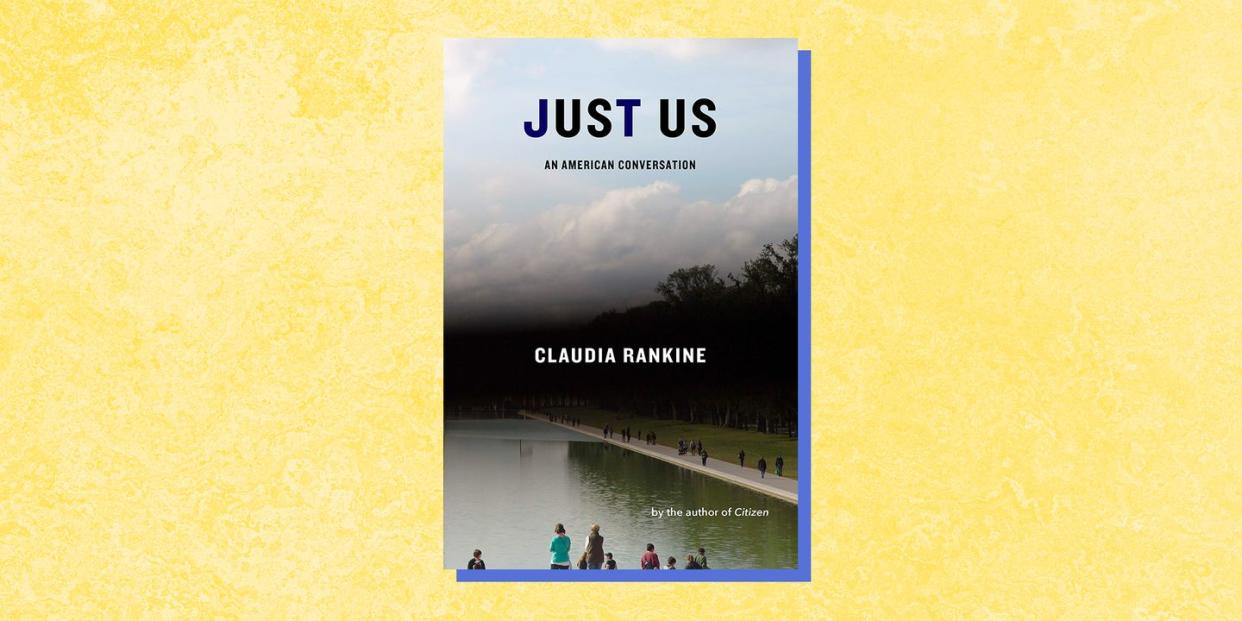Why Claudia Rankine Interviewed White Men in Airports For Her New Book

Just Us: An American Conversation is the opposite of a lofty, theoretical book on racism. Its author, Claudia Rankine, is one of our leading intellectuals and teaches a course at Yale called "Constructions of Whiteness," yet this essential, timely work of nonfiction is more playbook than scholarly tome.
It features snippets of conversations she’s had with random white male strangers; deceptively easy-to-read factoids that remind us how little most of us know about how American racism has unfolded; transcripts of 911 calls and police interactions; and personal reflections on whether something a close white friend said reveals bias.
The book urges us to step outside the safety zone of politeness to interrogate the uncomfortable and to listen, even (especially) when we don’t like what we’re hearing. O’s books editor, Leigh Haber, spoke with Rankine about how she sees the current racial climate, and where Just Us figures into the dialogue.
For the book, you initiated conversations on planes and in airport terminals—to see if by connecting with people you don’t know, you’d understand white privilege any differently. First off, why airports?
They’re liminal spaces—in between—when you’re thrown together with someone you wouldn’t normally be with.
What did you hope to accomplish?
Though my husband is white, I’ve always fallen into easy banter with all kinds of strangers except white men. I thought maybe it was time to engage—I wanted to try.
Did you hope they would see themselves differently as a result, or aim to teach them something?
Sometimes my students will say, “It’s not my job to educate white people.” To me that implies that as Black people we already know all we need to, and that conversations aren’t valid places for growth for everyone. Having said that, I do understand the weariness that sets in when a whole room of white people turn to the one Black person to say, “Can you explain that?” But our country won’t just wake up one day and walk out of its systemic white-supremacist orientation. We have to deal with it, which means talking about how our conditioning positions us to perceive things as we do. If you don’t listen to, and then push back on, say, a white man telling you his son hasn’t gotten into a prestigious university because he “can’t play the diversity card,” we’ll remain stuck where we are.
What do you mean when you write, “I’m historied out?"
Most African Americans feel exhausted by the sameness of history—that it always lands us in the position of a dead person. We bear the burden of being confronted as the slaughter happens over and over.
You prefer “white living” to the phrase “white privilege.” Why?
What’s meant by “white privilege” is the ability to simply live your life—to walk down the street or enter your house without thinking about being stopped or shot. But it’s often misunderstood as being about economic advantage. Not long ago, I wrote a piece on the subject for the New York Times. I got more than 2,000 responses from mostly white people, many who said, basically, they didn’t think I understood that they’d worked hard for everything they had, that their parents were immigrants, etc.
They’d missed the point?
Yes, that whiteness is an economic system that was created. With the 1790 immigration law, the only people who could vote or own property were white men. The person who names the thing controls the thing. If you don’t have access to property or voting rights, the privileges of whiteness are not within reach.
You say that when someone remarks, “I don’t see color,” it “pulls an emergency brake in my brain.”
What I hear in that is a refusal to recognize the difference in terms of how people are treated, the active role race plays in the day to day. It puts me on alert that there is an unwillingness to see my reality, that certain things I say will not be received.
You’re a poet, and poetry is sprinkled throughout the book. In this fraught time, what role does the poet play?
We bring the moment back to you—the feeling of it, not just the history or the narrative. Poetry lives inside the unspoken, and when a poem works, it taps into a kind of emotional electricity of communication. It allows for what the body knows without the rationale of social constraints.
For more stories like this, sign up for our newsletter.
You Might Also Like

